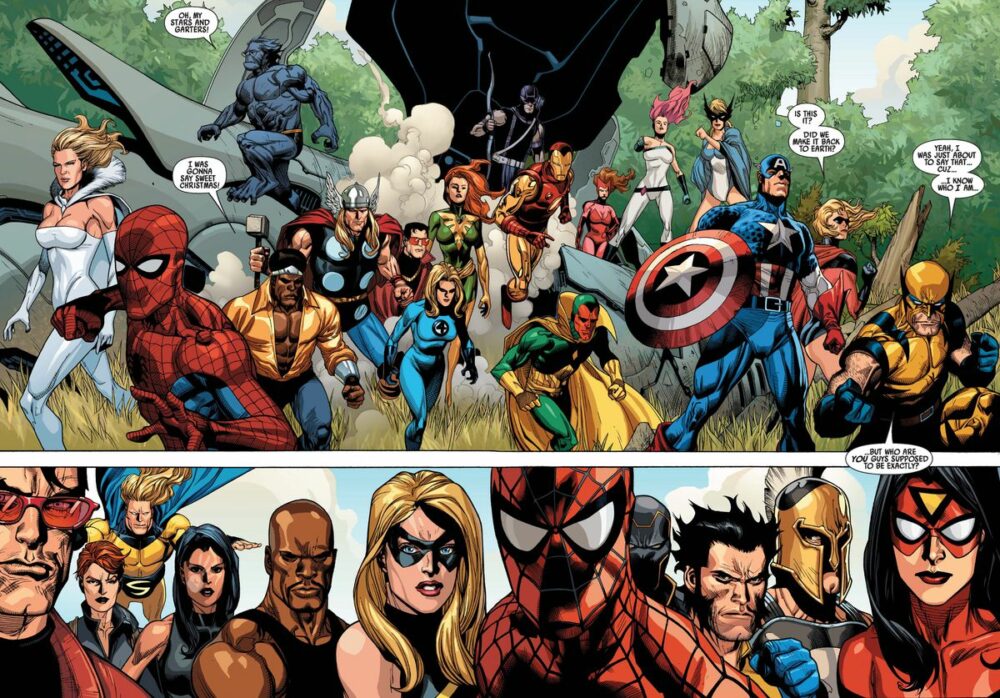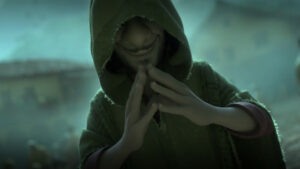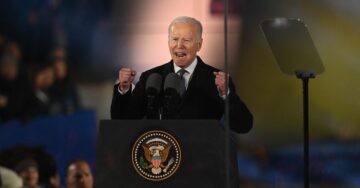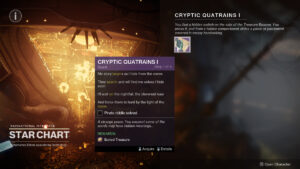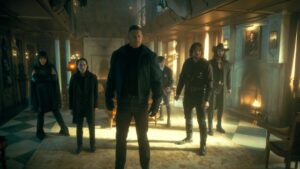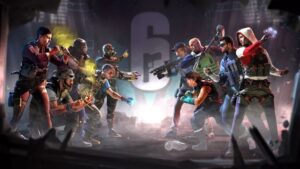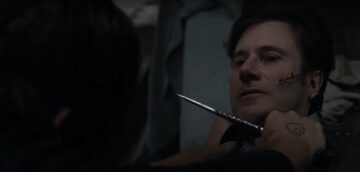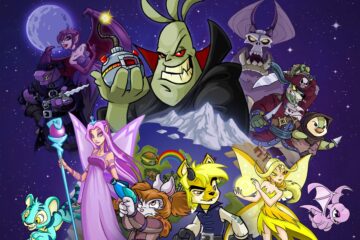There is a moment near the end of the first episode of Marvel’s Secret Invasion TV series that will feel uneasily familiar to politically attuned viewers. In it, a young man walks briskly through a public square in Moscow, a backpack draped over his shoulder. He is an infiltrator, a hidden alien Skrull whose true identity is undetectable to those around him, and his backpack contains a “dirty bomb” capable of causing mass death to those around him. The attack is halted, courtesy of series protagonist Nick Fury, but in the aftermath, a suspect apprehended by authorities shouts, again and again, “I’m an American! I’m an American!” Nobody listens.
Watching that moment play out, you could be forgiven for thinking that the Disney Plus series is out to make a trenchant political critique: that, for perhaps the first time in the decade-plus tenure of the Marvel Cinematic Universe, it intends to use the tools of superheroism and science fiction to draw our attention to the overreach of military authority, and the violent suspicion bred by fears of terrorism. Alas, you would be wrong. A few minutes into the following episode, the moment has been largely forgotten, the narrative having moved along to a plot about government officials and SHIELD bigwigs replaced by alien shape-changers in a conspiracy that feels both labyrinthine and inconsequential at the same time.
It is, in fact, altogether puzzling: How can a series rooted in fears of government conspiracy, and the inability to trust or believe our neighbors and compatriots, seemingly have nothing to say about politics or the government at all? How can a story about asylum-seeking refugees driven toward militant violence manage to avoid any actual evocation of either subject at all? Or, to put it more bluntly still, why are the politics of Secret Invasion so hard to trust?
Aliens among us
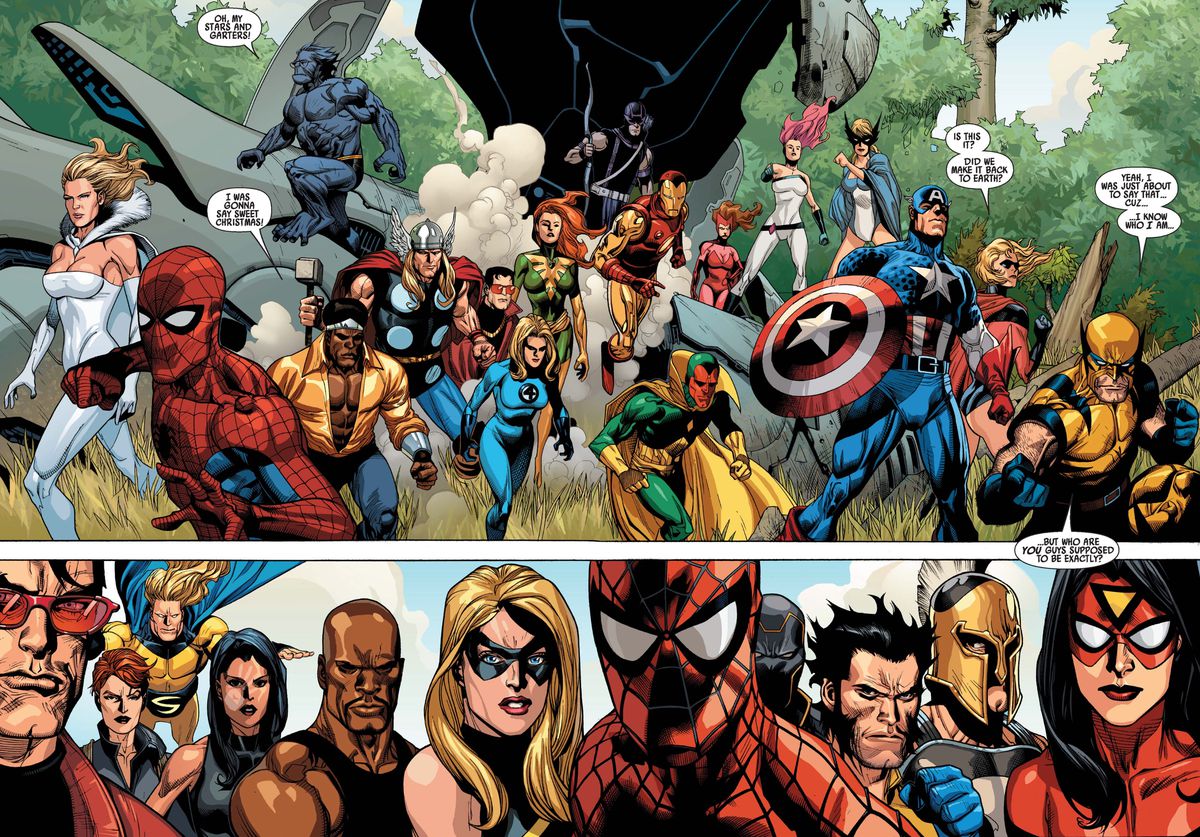
If we want to understand the politics of Secret Invasion, we need to go back to a very different political moment: the latter days of the George W. Bush administration in 2008, when the Secret Invasion comic series took form at Marvel. The early 2000s were a heady time for Marvel Comics. Despite its self-styled reputation as “the world outside your window,” Marvel had for decades engaged with real-world politics only in the most anodyne or else allegorical terms — notable outliers notwithstanding. But the first decade of the new millennium confronted the company with a heady brew of artistic, political, and editorial influences that must have seemed unprecedented. And compounding it was the internal politics of the comic publisher itself, which was climbing out of the twin crises of bankruptcy and cratering sales thanks to the guidance of new editor-in-chief Joe Quesada.
So when it came time for Marvel’s marquee writer Brian Michael Bendis to put together the company’s major event series of 2008, he drew heavily from the mood, zeitgeist, and newsy language pervading the wider pop culture. His vehicle was a story he had been setting up since taking over the publisher’s Avengers franchise in 2005: a cloaked, mysterious conspiracy involving infiltrators throughout the ranks of the planet’s political, criminal, military, and superheroic infrastructure that would turn out to be the work of the shape-shifting aliens known as Skrulls. And so it was that Secret Invasion would become Bendis’ big foray into the cultural minefield of post-9/11 discourse.
Bendis’ Skrulls were (for the first time) given an explicitly religious dimension to their warfare. Throughout the series, each time the aliens dispatch one of their human enemies, they repeat the cryptic refrain, “He loves you.” This is revealed to be a reference to a foreign and hostile god, who has given his blessing to the conquest of Earth. Elsewhere, the Skrull’s attacks are explicitly referred to as “extremism” and “terrorism” (albeit by the heroes combating them), and the Skrulls refer repeatedly to the “prophets” who foretold their holy conquest of a new homeworld.
It was a metaphor that readers weren’t likely to miss, and the storyline attracted a vast array of response, condemnation, and debate, even as it continued Marvel’s early-2000s hot streak of high-selling crossovers. For better or worse, the Secret Invasion comic made a statement about the politics of its time, and it took its lumps accordingly. So why does the Secret Invasion TV series feel so curiously incapable of doing the same?
Who can we trust?
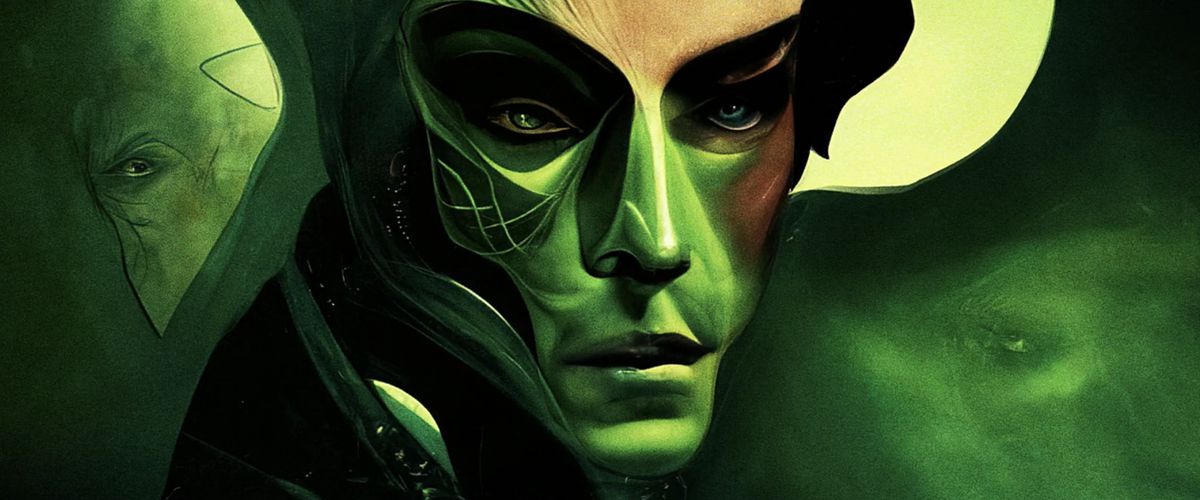
If the Secret Invasion of 2008 was about Bush-era paranoia manifested through the language of science fiction invaders, the Secret Invasion of 2023 is — at least superficially — a reflection of the fears and obsessions of the post-Trump era. The Skrulls, as imagined this time around, are a refugee race, given refuge on Earth by Nick Fury and SHIELD following the wartime loss of their own homeworld. That Fury has, in all the elapsed time since the 1990s-set Captain Marvel movie, failed to deliver on his promise to provide the aliens with a new land of their own is perhaps the series’ most pointed statement. When we first view the Skrulls in the pilot episode, they are crowded into increasingly dismal and impoverished refugee camps, waiting for a political restoration that never seems to come.
The result is the ascendance of the show’s major baddie, the political terrorist Gravik, who has spent the past several years systematically replacing high-level human figures with Skrull impostors so as to manipulate humanity into distrust, war, and ultimately annihilation — the better to leave the planet open to its Skrull inheritors. When the series first debuted, early chatter involved some raised eyebrows over the perceived similarity of this scenario to long-standing paranoias about Jewish citizens. And admittedly, the notion of ubiquitous aliens who look just like you, but have a hidden loyalty to a dangerous foreign state, does have a certain alarming resonance with antisemitic conspiracies that go back centuries. When, in the second episode of the season, we glimpse of room full of all the Earth’s major heads of state, and find that every one of them is — surprise! — a Skrull in disguise, thoughts of 19th-century Illuminati delusions seem justifiable.
But looking at the show’s imagery of squalid slums full of Skrull asylees, it’s just as easy to flip the allegory on its head, and decide that the show means to present the victims-cum-villains as stand-ins for Palestinian refugees. That, after all, would seem to be the implication of the violent militancy to which Gravik increasingly pushes the Skrull leadership. In the second episode, during one of the few moments in which the series seems to genuinely feint toward significant commentary, Gravik is challenged by one of the imposter world leaders challenging his violent approach: “We did not end up hopeless refugees because we were unwilling to wage war,” she tells him. “We ended up hopeless refugees because we were too willing.”
Gravik’s rebuttal — that Fury’s repeated excuses and failures when it comes to providing the growing Skrull population with a home of their own leave them little choice but a war for their rights — is the sort of argument that’s worth taking seriously, and which would give an otherwise one-dimensional baddie an undeniably sympathetic cause to fight for. And maybe that’s the reason that the MCU’s Secret Invasion can’t quite bring itself to take him seriously at all.
Not human enough
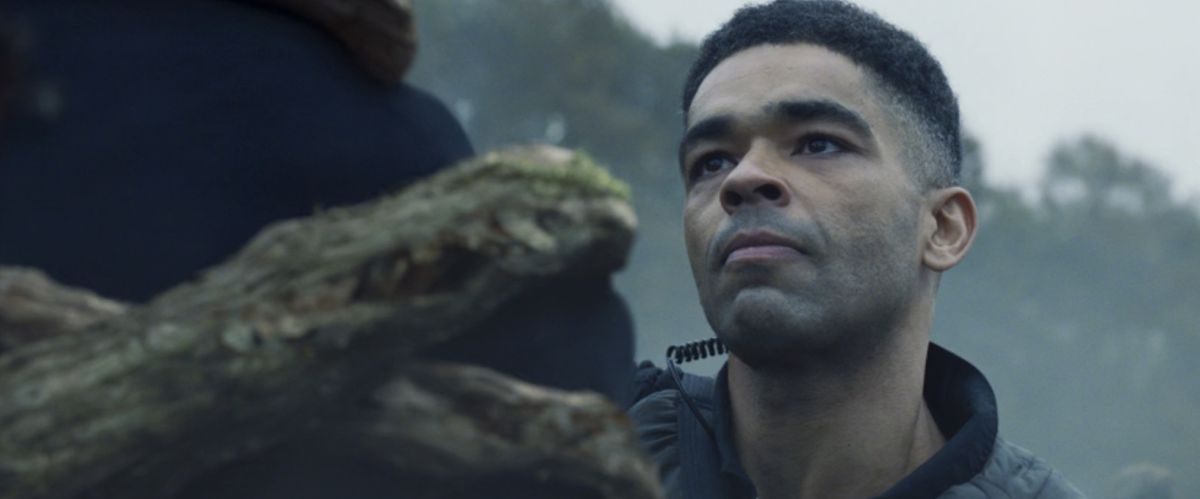
When the Secret Invasion comic was released in 2008, it didn’t take long before it became the target of pointed criticism, and not only from anonymous corners of the fan community. No less prominent a voice than writer Grant Morrison chimed in, writing in their 2011 book Supergods that Secret Invasion made “hamfisted attempts to compare the Skrulls to radical Islamists.” Meanwhile, and perhaps surprisingly, Bendis himself took almost the opposite position, telling Wizard magazine that it was the story’s humans, rather than its Skrulls, who were the objects of political allegory: “Isn’t an invasion of want, it’s an invasion of need,” Bendis told the magazine in 2008. “And this country was born on that [mindset]. We came and wiped out the people that were here because ‘it’s ours, and God told us to.’”
But whether or not the critiques were correct was almost secondary to the fact that they were real, prominent, and an unavoidable consequence of a story that actively engaged with the world around it.
And that perhaps explains why the 2023 iteration of Secret Invasion goes out of its way to avoid any such risk. Consider another sequence in episode 2, in which Fury has a tense debate with his sympathetic Skrull ally (and political moderate) Talos over whether or how the Skrulls should attempt to remain in human society.
Talos stakes out something of an assimilationist position against the wartime separatism of Gravik, arguing that Skrulls are fully capable of becoming a part of their newly (if secretively) adopted society: “We were being hunted across the universe,” he implores Fury. “I had two choices: I could let my people be annihilated, or summon them here to Earth…My hope is that, with your help, Skrulls and humans can coexist here on Earth.”
Fury’s response is a long monologue about the racism and discrimination he himself faced traveling in segregated rail cars during his childhood, followed by a curt dismissal of Talos’ utopian optimism in human compassion: “There is not enough room or tolerance on this planet for another species.” The notion that mutual discrimination ends up breeding distrust and conflict between oppressed groups who ought, by all rights, to be on the same side is a very real phenomenon that seems to beg for thoughtful, sustained consideration by both the show and its audience. And, in typical fashion, it gets neither: Fury’s comment is never explored or examined; the conversation is never mentioned or even alluded to again. It’s left abandoned like an uneaten meal at a Michelin-starred restaurant, while the show whisks us along to our 99-cent McDonald’s dinner of explosions and chase sequences.
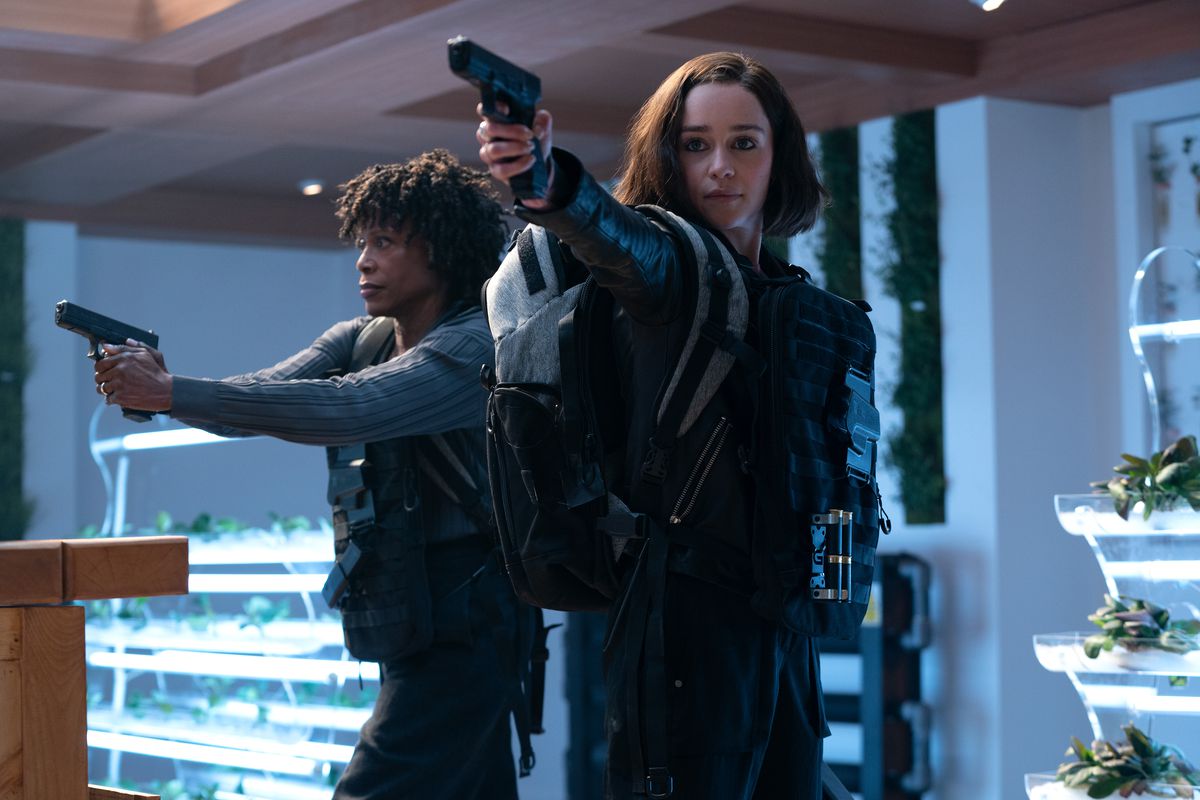
That unwillingness to have the courage of its own convictions is ultimately the most damning thing about Secret Invasion, and the reason why (if we’re going to be perfectly honest about it) you might not have even remembered it existed. After an initial buzz surrounding its release, just about the only topic of conversation this series has managed to provoke has been a flurry of outrage about the AI-generated imagery used in its opening credits. That in itself seems as good a metaphor as any for what Secret Invasion aspires to be: not so much art as an algorithmically generated simulacrum of it, and not so much political as an SEO-optimized list of political words sprinkled into dialogue for the sake of online discourse.
In that sense, it’s perhaps no great coincidence that this series has aired at a time when first writers and then actors have gone on strike in Hollywood, in a bid to protect themselves against studios that would just as soon see them replaced by autocompleted text and clip art. Artists and creators, by virtue of their humanity, represent risk and the possibility of ambitious failure, and that risk is at the heart of both real politics and real art. Risk would mean allowing a character like Gravik the seriousness his ethos of revolutionary uprising deserves. It would mean interrogating whether or not Talos’ hope for peace and acceptance can hold up in the face of a country and world in which (as Fury points out) even our own marginalized populations are made victims of the societies in which they dwell.
Secret Invasion deserves all these things, and the fact it was clear even part of the way through the show’s brief six episodes that it wouldn’t get them is a telling fact about where the MCU rests in the popular consciousness in 2023. This is, after all, not the first time Marvel has made vague motions toward thoughtful political questioning only to back off into the comfortable space of green-screen punches. The Falcon and the Winter Soldier pulled the same stunt in 2021, putting convincing arguments against arbitrary national borders and the danger of nationalistic jingoism into the mouths of the terroristic Flag Smashers, only to toss them aside when the characters undermined themselves with terrorism and villainy. That’s the modern Marvel television way: Give your villains enough credibility to be sympathetic, but deny them the satisfaction of being proven right. Nothing could dispatch their ideology with greater efficiency.
And the most insidious thing about it is that it’s not, in the end, an act of willful malice. Corporate superheroes are, at their core, an exercise in eternal stasis. In order to endure, they must not stray too far or fly too high from the status quo that made them marketable in the first place. So the assumptions of the superhero universe can be challenged, and prodded, and cast in doubt, but they can never truly be overthrown; that way lies cancelation. The perpetual status quo must win in the end.
So villains like the Skrulls must be compelling, but they must, in the end, be villains. And maybe, in the world of 2023, that’s just the best we have to settle for. Maybe, as we parse through the sea of algorithmically generated content and opaque studio directives, we need to content ourselves to look for those rare, fleeting moments of challenging truth underneath the comforting lies. We ought to be smart enough by now not to put our faith in superhero TV shows. After all, they told us they couldn’t be trusted.
- SEO Powered Content & PR Distribution. Get Amplified Today.
- PlatoData.Network Vertical Generative Ai. Empower Yourself. Access Here.
- PlatoAiStream. Web3 Intelligence. Knowledge Amplified. Access Here.
- PlatoESG. Automotive / EVs, Carbon, CleanTech, Energy, Environment, Solar, Waste Management. Access Here.
- BlockOffsets. Modernizing Environmental Offset Ownership. Access Here.
- Source: https://www.polygon.com/23807492/secret-invasion-mcu-disney-plus
- 2005
- 2008
- 2023
- a
- About
- accordingly
- across
- act
- Actively
- actors
- actual
- administration
- adopted
- after
- again
- Against
- AI
- algorithmically
- alien
- Aliens
- All
- Allowing
- along
- altogether
- ambitious
- among
- an
- and
- anonymous
- Another
- any
- approach
- ARE
- arguments
- around
- array
- Art
- artistic
- Artists
- as
- aspires
- At
- attempts
- attention
- attracted
- audience
- Authorities
- Authority
- avoid
- back
- Bankruptcy
- BE
- became
- because
- become
- becoming
- been
- before
- being
- believe
- BEST
- Better
- between
- BIG
- blessing
- body
- book
- borders
- both
- Bred
- Breeding
- brian
- bring
- but
- by
- came
- CAN
- capable
- cars
- Cause
- causing
- centuries
- certain
- challenged
- challenging
- character
- characters
- chase
- choice
- choices
- cinematic
- Citizens
- clear
- Climbing
- coincidence
- come
- comes
- comment
- Commentary
- community
- company
- company's
- compassion
- compelling
- conflict
- Consciousness
- Consider
- consideration
- Conspiracy
- content
- continued
- Conversation
- convincing
- Core
- corners
- corporate
- correct
- could
- country
- CouRage
- crashed
- Creators
- credibility
- Criminal
- crises
- criticism
- crowded
- cultural
- Culture
- Danger
- dangerous
- days
- death
- debate
- debuted
- decade
- decades
- decide
- deliver
- deserves
- despite
- dialogue
- DID
- different
- Dimension
- dinner
- Discrimination
- Dispatch
- distrust
- does
- doing
- Doubt
- draw
- driven
- During
- each
- Early
- earth
- easy
- editor-in-chief
- Editorial
- efficiency
- either
- else
- emerge
- end
- ends
- engaged
- enough
- episode
- era
- Ethos
- even
- Event
- Every
- Exercise
- explains
- explored
- Face
- faced
- fact
- Failed
- Failure
- faith
- falcon
- familiar
- fan
- far
- Fashion
- fears
- feel
- few
- Fiction
- fight
- figures
- find
- First
- first place
- first time
- Fly
- Following
- For
- foray
- foreign
- forgotten
- form
- Franchise
- from
- full
- fully
- Fury
- Gaming
- generated
- George
- George W. Bush
- Get
- give
- given
- glimpse
- go
- goes
- going
- gone
- good
- Government
- Government Officials
- grant
- great
- greater
- Group
- Growing
- guidance
- guns
- had
- Hard
- has
- Have
- having
- he
- head
- heads
- heart
- heavily
- help
- here
- heroes
- hidden
- High
- him
- his
- hold
- Hollywood
- Home
- Homeworld
- hope
- hot
- How
- HTTPS
- human
- Humanity
- Humans
- i
- Identity
- if
- imagined
- in
- increasingly
- Infrastructure
- initial
- intends
- internal
- into
- involved
- involving
- Is
- IT
- iteration
- ITS
- itself
- joe
- jpg
- just
- known
- Land
- language
- largely
- leaders
- Leadership
- least
- leave
- left
- less
- lies
- like
- likely
- List
- Little
- Long
- Look
- looking
- loss
- loves
- Loyalty
- made
- Magazine
- major
- make
- Malice
- man
- manage
- managed
- Marvel
- mass
- maybe
- mean
- means
- Meanwhile
- Michael
- might
- Military
- minutes
- mixed
- Modern
- moment
- moments
- mood
- more
- Moscow
- most
- motions
- moved
- movie
- much
- must
- mutual
- my
- narrative
- National
- Near
- need
- neighbors
- never
- New
- newly
- nick
- no
- not
- nothing
- Notion
- now
- number
- objects
- of
- off
- officials
- on
- One
- online
- only
- opaque
- open
- opening
- opposite
- optimism
- or
- order
- otherwise
- our
- ours
- ourselves
- out
- outside
- over
- overreach
- own
- part
- Past
- peace
- People
- perceived
- perhaps
- phenomenon
- pilot
- place
- planet
- plants
- plato
- plato data intelligence
- platodata
- platogaming
- play
- Points
- political
- politics
- Polygon
- pop
- Popular
- population
- populations
- position
- possibility
- powers
- present
- prison
- prominent
- promise
- protagonist
- protect
- proven
- Provide
- providing
- public
- Publisher
- pushes
- put
- putting
- quite
- Race
- racism
- radical
- Rail
- raised
- Ranks
- Rare
- rather
- readers
- Real
- real world
- reason
- reflection
- refugees
- release
- released
- remain
- Repeat
- represent
- Reputation
- response
- restaurant
- restoration
- result
- Revealed
- revolutionary
- rights
- Risk
- room
- rooted
- sales
- same
- satisfaction
- say
- scenario
- Science
- science fiction
- SEA
- season
- second
- secondary
- Secret
- see
- seem
- seemed
- seemingly
- seems
- segregated
- sense
- Series
- seriously
- setting
- settle
- several
- she
- shield
- should
- show
- shows
- side
- significant
- since
- SIX
- smart
- So
- Society
- some
- something
- Soon
- Space
- square
- stakes
- State
- Statement
- Status
- still
- Story
- storyline
- Stray
- strike
- studio
- subject
- such
- superhero
- superheroes
- surrounding
- Take
- taking
- Target
- television
- tells
- terms
- Terrorism
- terrorist
- text
- than
- thanks
- that
- The
- the world
- their
- Them
- themselves
- then
- These
- they
- thing
- things
- Thinking
- this
- those
- Through
- Throughout
- time
- titles
- to
- To Leave
- together
- tolerance
- too
- took
- tools
- topic
- toss
- toward
- traveling
- true
- truly
- Trust
- trusted
- truth
- turn
- tv
- TV Series
- twin
- two
- typical
- ubiquitous
- ultimately
- Understand
- universe
- unknown
- unprecedented
- up
- us
- use
- used
- uses
- vast
- vehicle
- very
- victims
- View
- viewers
- Voice
- W
- wage
- waiting
- want
- war
- was
- way
- we
- were
- What
- when
- where
- whether
- while
- WHO
- whose
- why
- wider
- will
- willing
- win
- window
- Winter
- with
- words
- Work
- world
- worse
- worth
- would
- would give
- writer
- writing
- wrong
- years
- you
- young
- your
- zeitgeist
- zephyrnet
